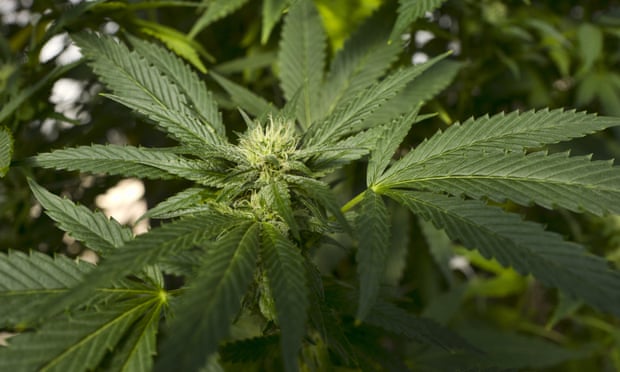Vote will coincide with 2020 general election; it follows legalisation of drug’s use for medicinal purposes

Cannabis is widely used in New Zealand but the main opposition National party does not support its legalisation.
Photograph: Richard Vogel/AP
New Zealand will hold a referendum on whether to legalise cannabis
for recreational use at the general election in 2020, a week after
legalising the use of cannabis for medicinal purposes.
The governing Labour party promised the Green party they would hold a
national referendum on legalising the drug, as part of the confidence
and supply agreement between the two.
Cannabis is widely consumed in New Zealand with police largely turning a blind eye to small-scale, personal use.
Cannabis is widely consumed in New Zealand with police largely turning a blind eye to small-scale, personal use.
The National Party leader, Simon Bridges, called the scheduling decision “cynical” and said he did not support the legalisation of cannabis, because of its impact on mental health and the message of “normalisation” it sent regarding recreational drug-use.
The Greens MP Chlöe Swarbrick, a long-time campaigner for the legalisation of all drugs, welcomed the government’s announcement and said it showed commitment to treating drug use and addiction as health issue rather than criminal ones.
The cannabis referendum coalition of New Zealand said scheduling the vote to coincide with the general election would “maximise turnout” and encourage thorough debate. Voting is not compulsory in New Zealand but a fine is issued to those who are eligible and do not vote. At the 2017 voter turn-out was 79% , the highest since 2005.
“We know from polls over a number of years that a majority of New Zealanders support cannabis law reform,” said #makeitlegal campaign manager Sandra Murray.
“We are focusing on supporting local areas to have an informed discussion about how reform will benefit their community, as well as how potential problems will be avoided.”
Last week’s law change paved the way for New Zealand companies to manufacture medicinal cannabis products for both the local and international market, an industry which has been touted as a potential game-changer for deprived Māori communities on the east coast of the North Island, who hope to turn the thriving illegal industry into a thriving legal one.

No comments:
Post a Comment